|
|
|
Sort Order |
|
|
|
Items / Page
|
|
|
|
|
|
|
| Srl | Item |
| 1 |
ID:
175773
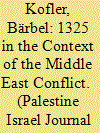

|
|
|
|
|
| Summary/Abstract |
The political participation of women should have long been a matter of discussion — if only because they make up half of the world’s population. We also know that when women are involved in processes, these processes change. According to a study by UN Women, this translates into concrete terms in the context of foreign and peace policy: If women were involved in the negotiation of a peace treaty, the probability that this peace would be maintained for 15 years or more would increase significantly.
|
|
|
|
|
|
|
|
|
|
|
|
|
|
|
|
| 2 |
ID:
168638
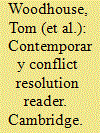

|
|
|
|
|
| Publication |
Cambridge, Polity Press, 2015.
|
| Description |
xxi, 419p.pbk
|
| Standard Number |
9780745686776
|
|
|
|
|
|
|
|
|
|
|
|
Copies: C:1/I:0,R:0,Q:0
Circulation
| Accession# | Call# | Current Location | Status | Policy | Location |
| 059749 | 303.69/WOO 059749 | Main | On Shelf | General | |
|
|
|
|
| 3 |
ID:
118006
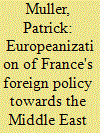

|
|
|
|
|
| Publication |
2013.
|
| Summary/Abstract |
France's prominent role in Europe's policy towards the Arab-Israeli conflict represents an interesting case study for the evolving research on Europeanization. While France's involvement in the CFSP is frequently described as a case of national projection through the EU, this view needs qualification. Proposing a novel conceptual categorization of different member state approaches to European foreign policy cooperation, this article shows that France's involvement in Europe's Middle East policy has gone through different phases. Guided by de Gaulle's politique arabe, France assumed a 'leadership' role in Europe's common foreign policy, leaving a strong mark on its collective diplomacy. Since the 1990s, however, a number of complementary changes have weakened France's capacity for leadership, challenging well-established French foreign policy positions. France's response to the mounting constraints of EU-level cooperation has oscillated between 're-nationalization' and efforts to 'facilitate' a common European approach, displaying a considerable degree of pragmatism and tactical adaptation.
|
|
|
|
|
|
|
|
|
|
|
|
|
|
|
|
| 4 |
ID:
026915
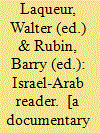

|
|
|
|
|
| Publication |
New York, Facts on File Publications, 1969.
|
| Description |
xiii, 704p.hbk
|
| Standard Number |
0871968738
|
|
|
|
|
|
|
|
|
|
|
|
Copies: C:1/I:0,R:0,Q:0
Circulation
| Accession# | Call# | Current Location | Status | Policy | Location |
| 026691 | 956/LAQ 026691 | Main | On Shelf | General | |
|
|
|
|
| 5 |
ID:
133745
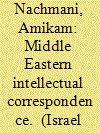

|
|
|
|
|
| Publication |
2014.
|
| Summary/Abstract |
Jacob Talmon and Arnold Toynbee were among the 20 most influential historians of the twentieth century in a list published by the Dutch journal Intermediair in May 1980. But this is not the only common denominator between them: both faced strong opposition at home - Toynbee was ridiculed and Talmon was considered a 'self-hating Jew'. Following the generally accepted definition that an intellectual is one who attempts to shape history while it is still in progress, they both tried to shape developments in the Arab-Israeli conflict and to ameliorate its consequences. They failed, but their insights and suggestions are still valid today. They differed deeply with regard to major aspects of the Middle East conflict, in particular the right of the Jewish people to statehood. Following the 1967 Six Day War, they corresponded and discussed the Middle East conflict. The article focuses on this correspondence and quotes from their private papers, books and articles over the last 70 years, and from other sources. Sadly, not much has changed in the Arab-Israeli conflict. 'That which has been, it is that which shall be; and that which has been done is that which shall be done; and there is nothing new under the sun
|
|
|
|
|
|
|
|
|
|
|
|
|
|
|
|
| 6 |
ID:
174154
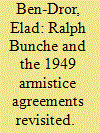

|
|
|
|
|
| Summary/Abstract |
The African American UN mediator Ralph Bunche ended the 1948 Arab-Israeli war by getting the combatants to sign armistice agreements. Awarded the Nobel Peace Prize in 1950, Bunche became an international hero, acclaimed as the outstanding mediator of the Arab-Israeli conflict. This impression emerged almost immediately; everything written over the years corroborated it. But studies published after the turn of the century propagated a different view of Bunche as a weak mediator, manipulated by the Israelis and Americans. The present article, drawing on materials from archives and other sources (some of them available only in Hebrew), including new knowledge about Israeli plans for military operations while the talks were in progress (most of them remained on paper), casts a different light on those months. Analysing Bunche’s role in the negotiations (principally with Egypt and with Jordan), it shows that he ran the talks objectively and skilfully and prevented a renewal of the fighting – which would have resulted in an overwhelming Israeli victory, at the expense of the Arab countries and Palestinians.
|
|
|
|
|
|
|
|
|
|
|
|
|
|
|
|
| 7 |
ID:
160589
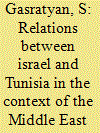

|
|
|
|
|
| Summary/Abstract |
The first contacts between the two countries date back to the early 1950s, when Tunisian representatives met with the Israeli delegation and Israeli labor leaders. At that time, Tunisia was seeking independence and was looking for Israeli support to achieve it. Habib Bourguiba, who was appointed prime minister of Tunisia after the country became independent in 1956 and was its president from 1957 to 1987, took what overall was a peaceful attitude toward Israel and to the region as a whole. In 1956, Bourguiba met with the Israeli ambassador to France, Jacob Tsur, and then Tsur met with the Tunisian finance minister, who sought Israeli assistance in building cooperative agricultural settlements.
|
|
|
|
|
|
|
|
|
|
|
|
|
|
|
|
| 8 |
ID:
052528
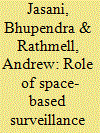

|
|
|
|
|
| Publication |
Emirates Center For Strategic and Research, 1998.
|
| Description |
81p.
|
|
|
|
|
|
|
|
|
|
|
|
Copies: C:1/I:0,R:0,Q:0
Circulation
| Accession# | Call# | Current Location | Status | Policy | Location |
| 041601 | 358.8/JAS 041601 | Main | On Shelf | General | |
|
|
|
|
|
|
|
|
|